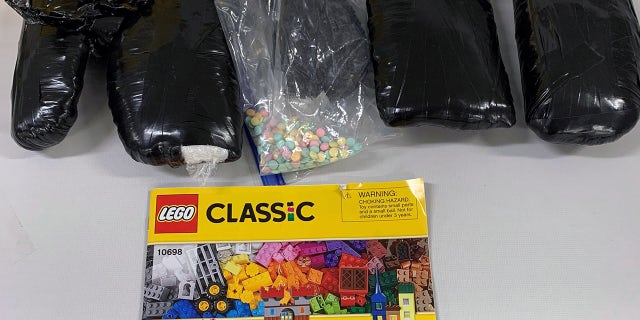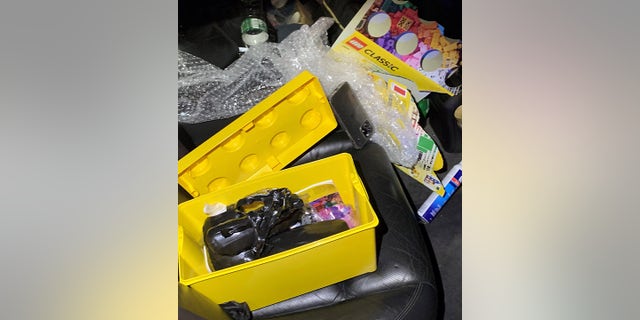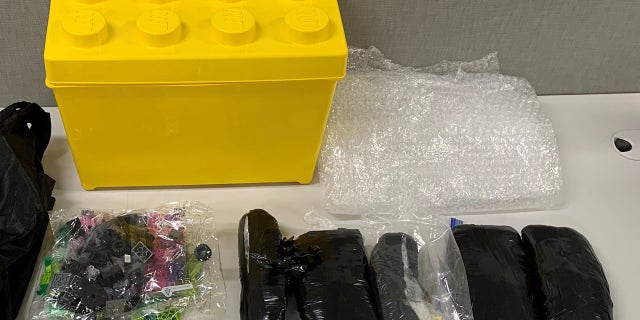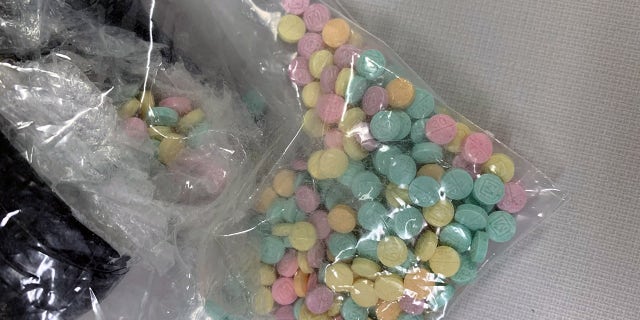The DEA sounded the alarm to the largest fentanyl seizure to date in New York City after a woman allegedly attempted to use a LEGO box to deter law enforcement, hiding a stash of 15,000 pills – many made to resemble candy or prescription oxycodone – inside the children’s toy container.
This single seizure of “rainbow fentanyl” removed the equivalent of 500,000 lethal doses from circulation in the Empire State, DEA Special Agent in Charge of the New York Division Frank Tarentino said. In the same reporting period, DEA seized the equivalent of over 36 million lethal doses nationally.
This case represents a broader problem of Mexican cartels’ “most recent tactics to attract the public while deceiving them about the lethal drugs,” according to DEA New York Division. “The Sinaloa Cartel and Jalisco New Generation Cartel are mass-producing fentanyl pills in rainbow colors to not only brand their products, but use colors and dyes to mimic candy and/or legitimate prescription drugs.”
Besides being candy-colored, many of the 15,000 fentanyl pills found concealed in the LEGO box were also imprinted with “M” and “30” to resemble “30 M”, Oxycodone Hydrochloride 30 mg pills.
DEA announces the largest fentanyl seizure to date in New York City after colorful pills were found hidden in a LEGO box.
( U.S. Drug Enforcement Administration (DEA))
Latesha Bush, 48, of Trenton, New Jersey, was charged with criminal possession of a controlled substance in the first and third degrees through a criminal complaint filed by the Office of the Special Narcotics Prosecutor (SNP). She was arraigned in Manhattan Criminal Court on Friday.
Bail was set at $25,000 cash/$150,000 insurance company bond/$100,000 partially secured surety bond.
“Using happy colors to make a deadly drug seem fun and harmless is a new low, even for the Mexican cartels,” NYC Special Narcotics Prosecutor Bridget G. Brennan said. “Fentanyl is already involved in more than 80% of overdose deaths in the city. If you take any drug sold on the street or through the internet, regardless of its medicinal markings or festive appearance, you risk your life. My office and our partners are committed to intercepting lethal fentanyl and ensuring that these rainbow-colored pills don’t lead more people down a sad path of substance use and overdose death.”

Mexican cartels use colors and dyes on fentanyl pills to mimic candy and/or legitimate prescription drugs.
( U.S. Drug Enforcement Administration (DEA))
At approximately 7:11 p.m. on Sept. 28, members of the DEA’s New York Drug Enforcement Task Force (NYDETF) Group T-12, comprised of agents and officers with DEA New York Division and the NYPD, were conducting surveillance as part of an ongoing investigation into narcotics trafficking when they allegedly observed Bush carrying what appeared to be a black tote bag wrapped around a large object as she entered a vehicle in front of 475 10th Avenue in Manhattan.
Upon stopping the vehicle, agents and officers allegedly found Bush in the rear seat, with two black tote bags and a yellow LEGO container also in the rear seat.

Approximately 15,000 candy-colored fentanyl pills were seized in Manhattan from a LEGO box.
( U.S. Drug Enforcement Administration (DEA))
Inside the LEGO container were several brick-shaped packages covered in black tape lying next to LEGO blocks. The black tape covering one of the packages had been partially opened, exposing multi-colored pills inside. A subsequent examination of the packages revealed they contained approximately 15,000 pills.
During the investigation, agents and officers learned that just prior to the arrest, Bush had traveled from New Jersey to the vicinity of 475 10th Avenue in a rental car. Agents and officers also learned that the multi-colored fentanyl pills allegedly originated in Mexico, the DEA said.

DEA warns that trafficker-quantities of “rainbow fentanyl” arrived in New York concealed in a LEGO box.
( U.S. Drug Enforcement Administration (DEA))
Last week, the DEA announced the results of the third phase of the “One Pill Can Kill” initiative focused on combating the fake pill threat, which led to the seizure of more than 10.2 million fentanyl pills and approximately 980 pounds of fentanyl powder from May 23 through Sept. 8, 2022.
The amount of fentanyl taken off the streets during that surge is equivalent to more than 36 million lethal doses removed from the illegal drug supply, the DEA said. Additionally, 338 weapons were seized, including rifles, shotguns, pistols, and hand grenades.

Mexican cartels are mass-producing fentanyl pills in rainbow colors.
( U.S. Drug Enforcement Administration (DEA))
There were 390 cases investigated during this period, 51 cases are linked to overdose poisonings and 35 cases link directly to one or both of the primary Mexican cartels responsible for the majority of fentanyl in the United States – the Sinaloa Cartel and the Jalisco New Generation Cartel (CJNG).
In addition, 129 investigations are linked to social media platforms, including Snapchat, Facebook Messenger, Instagram, and TikTok.